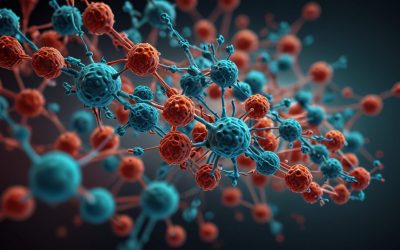As you stand on the frontlines, grappling with the aftermath of a pandemic, it’s the early bird that might just catch the worm when it comes to combating long COVID symptoms. You’re aware that for those you serve, the shadow of COVID-19 lingers, manifesting as persistent and debilitating symptoms. But there’s hope on the horizon. Research suggests that if you administer treatments like antivirals and monoclonal antibodies promptly after infection, you’re not just easing immediate suffering; you’re potentially curtailing the drawn-out battle with long COVID. You’ll find that early intervention doesn’t only reflect your commitment to care but could also reshape the recovery landscape for countless individuals. It’s crucial, though, to stay informed as evidence evolves, ensuring that the support you provide is grounded in the latest scientific understanding.
Key Takeaways
- Early treatment of COVID-19 may play a crucial role in mitigating the risk of developing long COVID.
- Timely administration of antivirals and monoclonal antibodies can lessen the severity and duration of long COVID symptoms.
- Antivirals like Paxlovid and molnupiravir impede viral replication and reduce the inflammatory burden.
- Monoclonal antibodies significantly diminish the incidence of neuro-behavioral symptoms.
Understanding Long COVID
You need to grasp that ‘Long COVID’ is a term for the continuation of symptoms that persist for weeks or months after the acute phase of a SARS-CoV-2 infection has resolved. This condition represents a significant public health concern due to its chronic nature and impact on individuals’ quality of life. As you’re likely aware, the spectrum of long COVID symptoms is broad and can affect multiple organ systems, leading to a range of clinical manifestations from fatigue and dyspnea to cognitive impairments colloquially referred to as “brain fog.”
Emerging evidence suggests that early treatment of COVID-19 may play a crucial role in mitigating the risk of developing long COVID. Recent studies underscore the importance of prompt intervention with antiviral medications and monoclonal antibodies. Antiviral treatments work by inhibiting the replication of SARS-CoV-2, thereby potentially reducing the viral load and subsequent tissue damage that could trigger prolonged symptoms. Similarly, monoclonal antibodies, which are designed to neutralize the virus, may offer a protective benefit against long COVID symptoms, particularly those affecting neurological and behavioral functions.
It’s important to note the observed gender difference, with females showing a higher propensity for long COVID, which suggests that gender-specific approaches might be warranted in the management and early treatment strategies for COVID-19. Given the current knowledge gap, it is imperative to advance research in this domain to fully understand the implications of early therapeutic interventions on the long-term outcomes of COVID-19 survivors. Your dedication to serving others by staying informed on these findings is pivotal in improving care and support for individuals affected by long COVID.
Early Intervention Strategies

Considering early intervention strategies, it’s essential you’re aware of how timely administration of treatments like antivirals and monoclonal antibodies can significantly lessen the severity and duration of long COVID symptoms. These therapies must be deployed promptly to optimize their effectiveness. For high-risk individuals, the early use of these treatments is not just beneficial, it’s imperative for preventing the progression to long-term complications.
Antivirals such as Paxlovid and molnupiravir act to impede viral replication, thereby reducing viral load and the inflammatory burden that can contribute to long COVID. Monoclonal antibodies, on the other hand, are designed to bind to the spike protein of SARS-CoV-2, neutralizing the virus and preventing cell entry. Both classes of treatment have been shown to have a protective benefit against the development of persistent post-acute sequelae of SARS-CoV-2 infection.
Here is a detailed overview of early intervention strategies in tabular form:
| Treatment Type | Mechanism of Action |
|---|---|
| Antivirals | Inhibit viral replication to decrease viral load |
| Monoclonal Antibodies | Neutralize virus to prevent cell entry and propagation |
The successful implementation of these interventions relies on a robust healthcare infrastructure capable of delivering treatments swiftly upon diagnosis. Ongoing clinical trials are further refining these strategies with a focus on SARS-CoV-2–specific approaches and alternative administration routes for monoclonal antibodies.
Early intervention strategies are a cornerstone of patient care in the fight against COVID-19. Your role in administering these treatments and educating patients about their benefits is crucial. By acting promptly, you contribute to improved patient outcomes and the prevention of unnecessary hospitalizations.
Impact on Symptom Severity
You’ll find that the efficacy of symptom reduction is closely tied to the timing of therapeutic intervention, with antiviral and monoclonal antibody treatments demonstrating quantifiable decreases in the severity of long COVID symptoms. Studies indicate that these early interventions can alter the trajectory of the disease, leading to a more favorable severity scale comparison when administered promptly post-diagnosis. This correlation underscores the importance of rapid response in the management of COVID-19 to mitigate the progression of long-term sequelae.
Symptom Reduction Efficacy
One might notice a significant decrease in the severity of long COVID symptoms with early treatment using antivirals and monoclonal antibodies. The findings from recent studies underscore the following:
- Antiviral Efficacy: Early COVID treatment with antivirals presents a protective benefit, notably reducing symptom severity and enhancing patient outcomes.
- Monoclonal Antibody Impact: Monoclonal antibodies significantly diminish the incidence of neuro-behavioral symptoms, indicating potent efficacy in symptom severity mitigation.
- Therapeutic Timeframe: Prompt initiation of treatment options is crucial for maximizing the reduction of long COVID symptoms.
- Neuro-behavioral Symptom Focus: Both antivirals and monoclonal antibodies have been found to specifically target and reduce neuro-behavioral long COVID symptoms, affirming their role in symptom severity management.
Early Intervention Benefits
The early use of antivirals and monoclonal antibodies can significantly lessen the severity of your long COVID symptoms. Studies indicate that initiating Early Outpatient COVID-19 treatment, especially with these therapeutic agents, presents a protective benefit. Specifically, antivirals work by inhibiting the replication of the virus, thereby reducing viral load and the subsequent inflammatory response that often leads to persistent symptoms. Monoclonal antibodies, tailored to neutralize the SARS-CoV-2 virus, help to prevent the progression of the disease and mitigate the onset of complex neuro-behavioral symptoms associated with long COVID. Your commitment to early intervention not only aids in immediate recovery but also serves as a shield against the prolonged effects that can disrupt quality of life.
Severity Scale Comparison
Your treatment’s timing plays a crucial role in the severity scale comparison, revealing that early intervention can significantly dampen the intensity of long COVID symptoms. For individuals at high risk of severe disease, the implications are profound.
- Antiviral Treatment: Initiated promptly, antivirals reduce the risk of transition to long COVID, lessening symptom severity.
- Monoclonal Antibodies: These are shown to decrease the incidence and intensity of neuro-behavioral symptoms, aiding in a milder long COVID experience.
- Severity Reduction: Both treatments demonstrate a correlation with a lower severity score on long COVID scales, particularly when administered early.
- High-Risk Populations: Early treatment is especially critical for you if you’re at high risk for severe disease, ensuring better outcomes and mitigated long COVID impacts.
Treatment Modalities Explored

You’ll find that treatment modalities for long COVID encompass a range of strategies, including tailored medication regimens. Studies indicate that physical therapy can confer functional benefits, addressing respiratory and musculoskeletal sequelae. Additionally, the utilization of alternative therapies is under scrutiny for potential adjunctive benefits in symptom management.
Medication Regimens
In examining the treatment modalities explored, it’s crucial to understand that various medication regimens, including monoclonal antibodies and oral antivirals, have shown promise in mitigating the persistence of long COVID symptoms. The study you’re considering has provided valuable insights into the effectiveness of these COVID-19 therapies. Here’s a detailed breakdown of the treatment options:
- Monoclonal Antibodies: Administered intravenously, these target the spike protein of SARS-CoV-2, preventing virus attachment and entry into human cells.
- Remdesivir: An intravenous antiviral that disrupts viral RNA synthesis.
- Paxlovid: An oral antiviral that inhibits the SARS-CoV-2 protease, critical for viral replication.
- Molnupiravir: Another oral antiviral inducing errors in the viral RNA, leading to a decrease in viral replication.
Patients in the treatment group receiving these therapies showed a marked reduction in long COVID symptoms.
Physical Therapy Benefits
Building on these medication strategies, incorporating physical therapy early in your COVID-19 treatment may further diminish the prevalence of long COVID symptoms. For you, as a provider serving patients with COVID, understanding the physical therapy benefits is crucial. Studies suggest that specific modalities, such as targeted exercises, can alleviate neuro-behavioral symptoms by enhancing neuroplasticity and reducing inflammatory markers. When combined with antiviral and monoclonal antibody treatments, physical therapy might offer a synergistic effect, optimizing recovery outcomes.
Early intervention with physical therapy could serve as a protective measure, potentially curtailing the progression to chronic symptomatology. Despite the promising indications, continued research is imperative to substantiate the scope of physical therapy’s impact within the early treatment paradigm for COVID-19.
Alternative Therapies Usage
Exploring alternative therapies, you can further diversify your treatment arsenal against long COVID symptoms, particularly by integrating approaches like acupuncture, herbal medicine, and mind-body techniques. In an outpatient setting, the inclusion of these methods may offer symptomatic relief and improve patient outcomes. Here’s a breakdown:
- Acupuncture: Stimulates specific points on the body to alleviate pain and improve respiratory function.
- Herbal Medicine: Utilizes phytochemicals with potential antiviral and anti-inflammatory properties.
- Mind-Body Techniques: Encourages stress reduction and mental health support, crucial for symptom management.
- Nutritional Support: Focuses on dietary interventions to bolster the immune system and aid recovery.
Case Studies and Outcomes
You’ll find that several case studies highlight the efficacy of early antiviral and monoclonal antibody treatments in mitigating long COVID symptoms. These detailed investigations focus on patients who were treated promptly after a COVID-19 diagnosis, monitoring their disease progression against control groups who did not receive such treatments.
For instance, a case study involving a cohort of middle-aged females, who are statistically more prone to long COVID, demonstrated a significant reduction in neuro-behavioral symptoms among those who received antivirals within the first week of symptom onset. The treatment regimen included a well-documented antiviral protocol, which appeared to interfere with the virus’s ability to replicate, thereby lessening the overall viral load and subsequent immune response that’s often implicated in prolonged COVID-19 sequelae.
Another case study examined the impact of monoclonal antibodies on long COVID symptoms, particularly those related to cognitive function and mood disorders. Patients were treated with monoclonal antibodies within days of their positive COVID-19 test. Results showed a marked decrease in the incidence of these neuro-behavioral symptoms compared to those who did not receive the treatment, suggesting a disruption in the pathophysiological chain that leads to long COVID.
The outcomes from these case studies provide compelling evidence supporting the early implementation of these therapies. By mitigating the acute phase of the disease, healthcare providers can potentially prevent the cascade of events that lead to chronic symptomatology. This proactive approach is a testament to the dedication to serving patients by not only addressing the immediate health concerns but also preemptively combating the long-term effects of this pervasive illness.
Implications for Healthcare Policy

As you consider the evidence from recent studies, it’s clear that healthcare policies must evolve to ensure early antiviral and monoclonal antibody treatments are readily accessible to those at high risk for long COVID. The protective benefits highlighted necessitate a policy framework that not only supports but prioritizes the early intervention against coronavirus disease 2019 (COVID-19) in the outpatient setting.
To address this need, consider the following action items:
- Expand Access to Early Treatments: Invest in infrastructure and resources to provide COVID-19 patients, particularly those at high risk, with immediate access to antiviral and monoclonal antibody treatments.
- Support Ongoing Research: Allocate funding for the continuous investigation of early treatment efficacy, including antivirals and immune-modulating drugs, to refine healthcare strategies.
- Ensure Affordability and Availability: Develop policies that make these treatments affordable and available to all segments of the population, removing financial and logistical barriers to care.
- Innovate Administration Methods: Incorporate alternative routes of administration for monoclonal antibodies into healthcare policy and explore antiviral combinations to enhance treatment effectiveness and prevent resistance.
The urgency to implement these policies stems from the need to prevent long COVID symptoms that can debilitate individuals and strain healthcare systems. As you serve your community, remember that your advocacy for these policy changes is crucial in shaping a healthcare environment that can effectively combat the challenges posed by COVID-19. By grounding policy decisions in robust evidence and compassion for those affected, you can contribute to a more resilient and responsive healthcare system.
Future Directions in Research
Your research initiatives should include a drug development roadmap that prioritizes the identification of compounds with potential to mitigate long COVID symptoms. It’s imperative that this roadmap integrates a comprehensive understanding of the pathophysiology of post-acute sequelae of SARS-CoV-2 infection. Delve into the molecular and immunological underpinnings of the virus’s impact on the body, especially during the acute phase, to inform targeted drug therapy that could prevent the progression to long COVID in patients.
As you map out future studies, consider the necessity of diversifying the routes of administration for existing therapeutics, such as monoclonal antibodies. Rigorous clinical trials assessing the efficacy of inhalation, subcutaneous, and intramuscular delivery methods could revolutionize early treatment protocols for COVID-19 patients. This could enhance the body’s initial immune response, potentially curtailing the development of persistent symptoms.
Moreover, you’re encouraged to explore de novo drug design, employing computational models to predict how novel compounds might interact with viral proteins and host cell receptors. This approach should be geared toward creating highly specific antiviral agents that can be administered shortly after a SARS-CoV-2 infection is confirmed. Combinatorial therapies that utilize a spectrum of antiviral mechanisms might be essential in mitigating the emergence of resistant viral strains.











